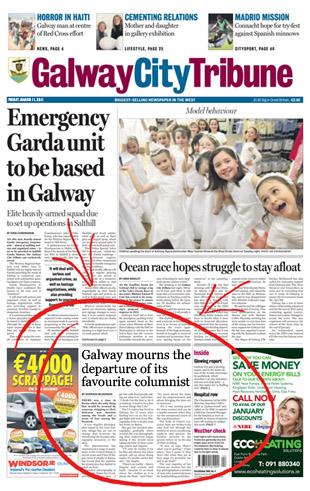Facebook is great. Apart from the countless things I don’t like about it. I don’t completely trust them with my data. I worry the small convenience I get from using their service is outweighed by the value of the information I give them. I suspect I’m being exploited in ways I don’t even understand yet. I’m concerned that a single commercial organisation has such a crucial, influential role.
You see where I’m going here. Facebook is the new Google. So when, with their new “Google+“, Google try to be the new Facebook, it’s basically Google being the new new Google. Which makes me dizzy.
But I wish them luck. It’s great to see some competition here, and I strongly suspect that I’m going to prefer Google+ to Facebook. It has one clear advantage anyway: You can separate your interaction into separate areas, or ‘Circles’ as they call them, like family, work and friends.
Which was also exactly the idea behind Diaspora… This start-up have (had?) a potentially Facebook-beating idea, but they took too long to become a thing you could actually use. Now someone else has stolen the mantle of Facebook challenger?
Well, yes and no. Google might be better than Facebook, but they can’t stop being Google. There is a prize – a prize almost beyond measure – to be won here, but I’m not sure if either can reach it.
Facebook, mostly by accident I think, created a wholly new thing. Thanks mainly to its ubiquity it has become an online extension of ordinary life, and one’s Facebook footprint a projection of the self onto the Web. And that in turn has the potential to solve another problem, if problem it be: That of authentication.
Google’s answer to this is a fully authenticated Web with no room for anonymity. A friendlier place for commerce and policing for sure, but obviously an unsafe one for the sort of political organisation we’ve seen in the Middle East recently. You may have noticed how it gets harder all the time to open a Google account. Last time I created one, I had to give them a mobile phone number. How long before it’s an iris scan?
Facebook presents a less foreboding form of authentication – not as rigorous as biometrics perhaps, but as good as we have in most of real life: Authentication by social relationship. To paraphrase an old saying, you can tell a lot about a person from their friends. And of course, most people simply wouldn’t go to the trouble of creating and maintaining a fake Facebook identity. So it is becoming almost a universal authentication system. You see “Login using Facebook” all over the place now, saving you the trouble of creating a new user account – with a new password – on all sorts of sites.
Which must come as quite a shock to Google, who probably thought they had that market in the bag.
It’s not a straight fight between these two approaches though. The system that will win is the one that can fuse the depth and usefulness of this casual social authentication with the rigour of a biometric one. An unfakeable Facebook(-like) profile would become virtually part of a person, indistinguishable almost from their identity. It could easily become the main way in which we interact with one another, both socially and commercially. And that would be some golden ring.
But if I’m going to (be forced to) use some sort of authentication, I want to do it through an organisation or system I don’t feel is exploiting or policing my thoughts and actions. I don’t think the social network with the complex and constantly changing privacy settings is the outfit for the job. Nor do I think it’s the corporation that seems actively hostile to the concept of privacy. If some system is going to be given the role of presenting me as trustworthy to others, it needs to be one that I trust too.
So it’s too early to give up on Diaspora or other “Facebook killers”. There is a vast amount of money to be made. All you have to do is be nice.
Related articles
- Day of the Social Media Day (i.doubt.it)






